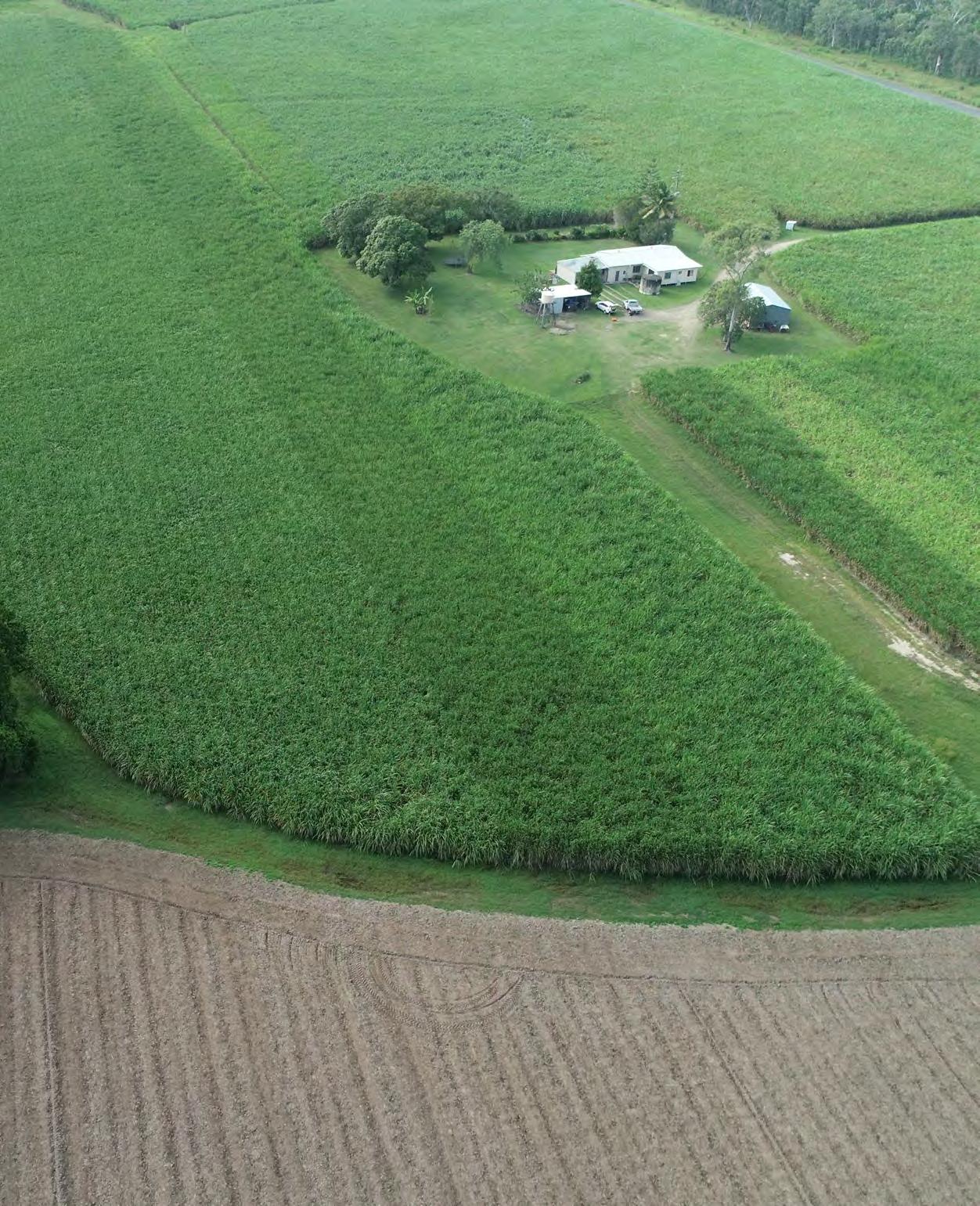








Congratulations to the 700 enterprises now accredited in Smartcane BMP!
Smartcane BMP has been working with sugarcane growers in Queensland to record and verify their farm practices. This has helped set the record straight and secure grower's reputations as stewards of the land. Interested in verifying your on-farm practices against industry best practice? Contact your local Smartcane BMP facilitator to discuss your options.
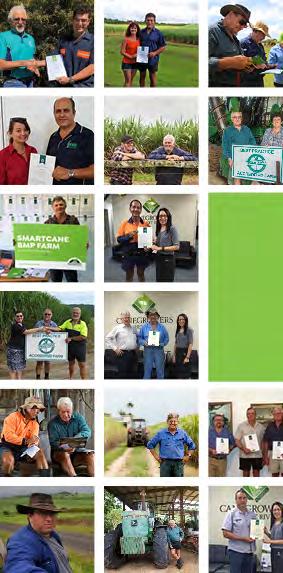



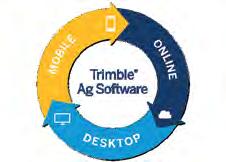

Prosperpine Young Farmers are sharing best management techniques to improve their yields
Growers have concerns on some limitations of the new electricity smart meters.
What will the creation of a Federal Environmental Protection Agency mean for growers?
Tony Rossi has been recognised as the QFF Reef Champion for environmental farm practices.
COVER IMAGE: Aloomba grower Tony Rossi shares his passion for farming and the environment. Photo credit: Renee Cluff. Read more on page 24...
CONTENTS IMAGE: 2023 CANEGROWERS calendar is out now along with the pocket diary and rainfall chart posted with this issue of Australian Canegrower. Photo credit: Tobi Schnell.

Editor: Wayne Griffin Design and classifieds: Robyn Devine
Articles appearing in Australian Canegrower do not necessarily represent the policies or views of CANEGROWERS
Published monthly by CANEGROWERS GPO Box 1032, Brisbane, Queensland 4001 Australia ABN 94 089 992 969 Telephone: 07 3864 6444 Email: editor@CANEGROWERS .com.au Website: www.CANEGROWERS .com.au

AUSTRALIAN CANEGROWER ISSN 0157-3039
Volume 45 Number 1 Subscriptions
Yearly subscriptions for 12 issues (postage included) Within Australia $176 inc GST Overseas (AUD) $265
The Burdekin Falls Dam Raising Project has been endorsed by the Queensland Government. The Sunwater project aims to raise the existing dam by two metres, thereby increasing water supply and supporting future water demand in the Burdekin and surrounding regions.
Burdekin Falls Dam is one of several dams being upgraded as part of SunWater's Dam Improvement Program.
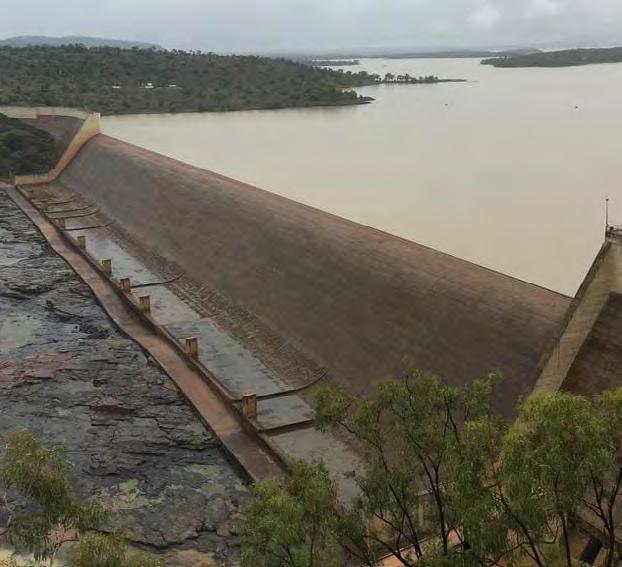
The project will also:
• increase the dam’s resilience to extreme weather events
• bring the dam in line with modern engineering design standards

• ensure the dam meets the safety requirements set out in the Water Supply (Safety and Reliability) Act 2008 (Qld).
Proposed works include:
• raising the existing dam spillway using concrete buttressing
• raising the abutments and saddle dams
• constructing a new rightbank saddle dam.
To find out more information visit sunwater.com.au/projects/ burdekin-falls-dam-raising , phone 1800 325 145 or email burdekin. projects@sunwater.com.au
A man and a woman have died after the motorcycle they were riding collided with a cane farmer’s tractor in the Mossman District. The motorcycle clipped the tractor on Cape Tribulation Road at Lower Daintree on December 10.
Chair Matthew Watson said the male rider, aged 64, hit the spray boom and died at the scene. A 35 year-old woman died from her injuries in hospital. The 67 year-old driver of the tractor was physically uninjured.
“The grower involved is shaken up but has support around him,” Matthew said.
“There are still tractors moving around so it’s a good reminder to motorists to be mindful of that.”
The police investigation centred on the activity of the motorcycle leading up to the incident. No charges have been laid.
It was clear by the end of August that in some mill areas the crush may need to go past Christmas. There was an increasing crop, higher than usual rainfall with the threat of a La Nina and mill performance was under pressure.
CANEGROWERS called for a meeting with the National Heavy Vehicle Regulator (NHVR), Queensland Department of Transport and Main Roads (TMR) and Queensland Police Services (QPS) to update them on the status of the crush and the expected need for oversized harvesting equipment to access roads during the Christmas curfew period. This is the period when vehicle over 2.5m width need to have a permit to travel

The result of this meeting was TMR and QPS agreed to approve permits to travel during the Christmas curfew based on individual applications including a detailed travel management plan. NHVR and TMR being forewarned were able to provide information to expedite the permit application process.
This timely intervention meant that operators had time to make applications with the assistance of CANEGROWERS District offices staff where required.
Further to this after representation from CANEGROWERS to TMR and QPS a compromise was reached to balance safety and productivity needs in the permit conditions with travelled approved from 5.00am to 9.00am on the 25 to 27 December instead of no travel.
Late harvest created further issues in some districts with potential standover cane possibly seeing a rise in rodent numbers and growers are already reporting extensive damage in some areas. CANEGROWERS successfully negotiated on behalf of members for a permit to allow the aerial baiting of rats.
Cane grub control in late harvest cane was also supported by CANEGROWERS securing an emergency permit with the Australian Pesticides and Veterinary Medicines Authority (APVMA) for the application of Imidacloprid beyond the normal 30 November cut-off date. The permit covers December 2022 and January 2023.
The permit will enable growers in the Mackay, Burdekin and Herbert River districts to control cane grubs in any late harvested sugarcane.
Members are encouraged to contact their local district office for clarification and more information in regard to solutions to assist with managing the late harvest challenges.
A group of young growers are sharing their best farming experiences to adopt farming best practices to maximise their returns, but it doesn’t come easy – planning and shared interests are the secrets to successful networking.
The Proserpine Young Farmers Group boasts more than 40 members and is delivering networking opportunities plus genuine, usable information for sugar cane producers to improve their farming practices and reduce run-off into the reef.
One of the early supporters of the group, and current treasurer, was Justin Blair, a CANEGROWER member from Proserpine.
Mr Blair, pictured, farms 300 hectares of sugarcane, producing between 16,000 tonnes in a dry year and 24,000 tonnes with good moisture.

Mr Blair said planning and advanced notice was one of the keys to holding a successful event for the group.
"We mostly try and plan things in the offseason," he said.
"It seems like it is hard to get young farmers, or farmers in general, around to the regular meetings but if we plan out something that people see the value in going... we get support," he said.
The Proserpine Young Farmers group consists of members under the age of 40, with growers, harvest operators, haulout drivers, accountants, engineers and agronomists involved.
The topics discussed within the group include best farming techniques for chemical use, ground preparation, rotational crops, spray calibration, precision agriculture, drone use, sugar pricing and marketing, pest control,

water and soil testing and fertiliser efficiency.
By sharing their experiences, the group is able to help each other adopt farming best practice to maximise returns while also minimising run-off of nutrients, chemicals and sediment into reef catchments.
The Queensland Department of Agriculture and Fisheries (DAF) is working with peer-to-peer groups like the Proserpine group to enable the adoption of best farming practice to grow the economy and safeguard the natural environment.
DAF funded the group as part of its Reef Water Quality Improvement Program so they could see first-hand examples of best practice farming improving production and reducing run-off into the reef.
Recent research by DAF shows almost 60 per cent of producers use peer to peer groups and 80pc say other farmers are their most trusted source of information about farming best practice.
Mr Blair said it was important the group as a whole guided what they wanted to learn about.
"Once we find out what the group wants to learn, it's really easy to find someone that's keen just to do it, do a workshop and present to the group," he said.
"Everyone puts a pretty high price on their time."
There have been field trips to farms outside the region, and even one to the Hay Point coal terminal to see how that business manages its environmental requirements.
In line with that, the group has been able to purchase a flow metre so members can investigate their irrigation and water usage with the intent of managing it better.
"Once you know how much water you are putting on you can see if you need to adjust it," Mr Blair said.
For Mr Blair's own operation, like most in the district, the farm is reliant on rainfall with a relatively conservative 1 - 1.5 megalitre water allocation used to top things up when needed.
Information supplied by Queensland Department of Agriculture and Fisheries




















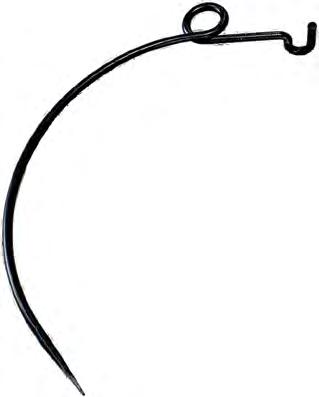










The Queensland Government is continuing its support for our sugarcane industry with a 5-year $14.25 million funding grant to Sugar Research Australia Limited (SRA) for research, development and extension (RD&E) activities.

This funding reinforces the strong history of commitment to the industry, providing stability and recognition for sugarcane growers.
Minister for Agricultural Industry Development and Fisheries and Minister for Rural Communities Mark Furner said the Queensland Government had been working with and supporting our iconic industry for 122 years.
This grant will see a further $14.25M committed to strategic RD&E enabling the uptake of advanced technology and innovative management practices.

SRA recently completed its new 5-year Strategic Plan, identifying 5 strategic pillars to help grow and shape the prosperity of the Australian sugarcane industry and regional communities. A key focus area is the development of an RD&E growth strategy for the sugarcane industry, ensuring investments provide greater impact and lead to new innovations that are easily adopted.
SRA Chief Executive Officer Roslyn Baker said the funding commitment from the Queensland Government was extremely welcome and would greatly assist the industry to grow and adapt to future challenges.
“Sugarcane is a vital industry to Queensland’s economy and for building regional prosperity,” Ms Baker said.
“SRA is focused on boosting our industry to deliver immediate value through our industry services and also long-term sustainability and growth. Investment in RD&E is critical, and I welcome the Queensland Government’s commitment to sugarcane RD&E through this grant.”
If the weather events of the past month have left you with soaked ground and water runoff it’s likely you’re dealing with poor root uptake due the wet conditions, as well as nitrogen loss via leaching and runoff.
Utilising LiquaForce’s new range of Valu and Stable products to your mid-season fertiliser regime will help boost cane growth in the wake of flooding and soil inundation.

By adding ValuN to your normal herbicide options, you
can boost plant uptake of nitrogen quickly to help get your crop back on track.
Valu and Stable fertiliser products will also help offer an insurance policy to allow you to quickly top up any shortfall of total applied nitrogen.
LiquaForce is ready to assess your crop needs via soil and plant tissue analysis and provide a tailormade solution for your crop, while remaining inside all regulatory requirements for nitrogen use.

As the saying goes, if I could predict the future I wouldn’t be working for a living. To that end, predicting what 2023 will bring is probably a fraught exercise and I am clearly not a clairvoyant.
But we can be informed by our past to help prepare for what lies ahead. From a policy standpoint the 2022 season was notable. Internationally, we saw the finalisation of the UK Free Trade Agreement, and renewed energy behind the EU Free Trade Agreement and some momentum behind the much-needed reform of the World Trade Organization. Nationally, agriculture continued to grow with National Farmers’ Federation reporting the sector is now at $86bn – well on the way to the 100bn target by 2030. The political shift with the Albanese Government was most impactful when we look at environment policy and the agreement to pursue a net zero emissions goal by 2050 and an interim target of 43% by 2030. Further we saw recent conclusions of the new and broad industrial relations legislation and policy positions on establishing a new environmental protection authority. These three positions will etch out a platform for our relationship with the Federal Government for many years. The year also demonstrated how our industry is evolving. The release of the Sugar Plus roadmap proposed a new more diverse industry. The reality of this could be closer than we think when we look at projects proposed and underway across many districts and the State Government in serious discussion around policies to support a sustainable aviation fuel industry. The sustainability credentials of growers were evident when we saw the first trial of a traceable, certified sustainable shipment of sugar marketed in November. Closer to the challenges in the paddock CANEGROWERS secured permits for Imidacloprid and RATOFF on the back of our earlier work in May to obtain an emergency use permit for MCPA (expired in August). All very practical outcomes to the business of farming. These examples in international policy, political advocacy, industry evolution and on ground action can fairly safely point towards where things will head in 2023.
We know there is further international progress to be made with the Free Trade Agreement in Europe and CANEGROWERS will continue to work towards promoting the value of sustainable Australian sugar into the United States market which is hungry for our product. Sustainability and market recognition of our certified, traceable supply chain will continue to be a key feature in 2023. Converting our current market recognition and use of technology into revenue for the industry is a major focus and will be a critical part of the sugar plus story. On ground input costs, especially fertiliser, chemicals and electricity will be top priorities but the broader concept of the ability of farmers to be able to conduct farming operations, transport products on our roads, run irrigation pumps and develop new country for an expanding industry are all issues that must be addressed if we are to see the industry evolve.
The list of issues to face us in 2023 will be extensive and as is always the case the issues we can’t predict may be our most challenging. But also, CANEGROWERS has been working on many of these issues for many years. Carefully positioning the industry to face them with confidence. We see all industry issues from the perspective what they mean for growers and their communities and with this in mind we will face the ups and downs of 2023 together.

As on ground service provider for Project Catalyst in the South Johnstone region, CANEGROWERS Innisfail is helping growers try new things.
By CANEGROWERS Innisfail Extension Officer Peter BeckeSince 2018, 20 growers in the South Johnstone Basin have been supported by Project Catalyst to trial new farm management practices. The aim has been to test innovations that may lead to improved productivity and sustainability.
Growers have been provided advice and support through trial design and establishment as well as harvesting and interpretation of results, giving them the confidence that their idea or practice change has made a difference.
In the South Johnstone, one of the greatest strengths of Project Catalyst is that it is part of an integrated local extension network. Having access to a broader support group providing guidance and assistance has helped provide consistent advice across their whole farming system to improve productivity and sustainability.
30 trials and projects have been run by growers involved in Project Catalyst in the South Johnstone Basin. They have covered everything from reduced, zonal and zero tillage plant cane to fallow management and mixed species cover crops, nutrient and pesticide management as well as banded and subsurface ameliorants.
Much of the interest in the district has been on fallow management, with growers given the confidence to have a go at a range of management options such as legume cover cropping and zero till mixed species cover crops.
Ensuring cover crop establishment prior to the onset of the wet season has been a defining factor in the region. Many of the trials have investigated zonal and zero till methods that allow for earlier planting of cover crops.
Selection of species has also been carefully considered in establishing a successful cover crop, with individual block constraints a key factor in choosing what type to plant.
For instance, growers have taken into account the risk of grass weeds in the fallow period if they plant a mixed species cover crop with a grass variety in it, and whether a species can tolerate water logging.
Management strategies should always be determined by what the grower is hoping to achieve from the fallow period in each block.
One of the trials that was undertaken looked at pre-plant sub surface banded mill ash. The investigation was built on previous work from Project Catalyst and driven by grower interest. It was aimed at increasing the longevity of ratoons and reducing the amount of synthetic nitrogen applied by improving soil health. The trial illustrated difficulties with deep banding the mill ash and there was no significant difference in cane yield between surface banded and sub-surface application.
The same aim was targeted in another trial which banded chicken manure in the furrow prior to the filling in of plant cane.
By providing integrated support and advice, Project Catalyst has enabled growers to assess their ideas and innovative practices on their own farms. The broader network including grower, extension and industry bodies has further developed and shared these ideas through the community.
Project Catalyst will be holding its annual forum February 19-21 in Cairns. It will bring together sugarcane growers from Mackay to the Wet Tropics to showcase innovation and practice change adoption that have improved farming performance and environmental outcomes.
Interested growers can get in touch with the team via projectcatalyst.net.au.
The Project Catalyst trials on new farm management practices have been happening in the South Johnstone Basin since 2018. Photos supplied by CANEGROWERS Innisfail
“Management strategies should always be determined by what the grower is hoping to achieve from the fallow period in each block”Pictured:
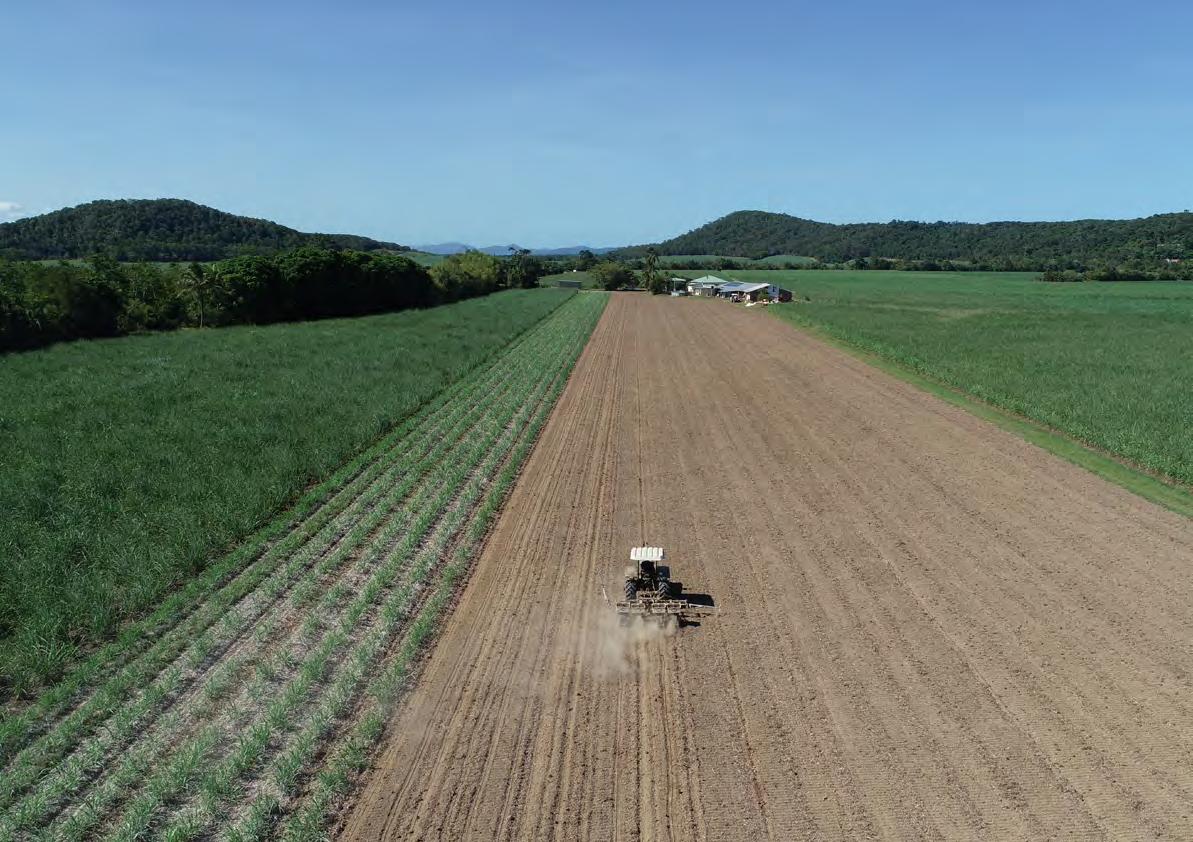


It has been a long year and unfortunately the crush is not yet over for some of our growers. This is difficult to handle for many given the sugar price is around $650 a tonne.
The wet weather has made ground conditions very challenging with the CCS levels dropping to a point where the viability of harvesting comes into question.
The damage done to paddocks from harvesting in the wet will have long term effects on soil structure which will reduce crops in the future as well as cause issues regarding fallow rotations if growers are forced to standover cane.
We saw after the 2010 crush crops reduced significantly in the 2012, 2013 and 2014 years as well as the extremely difficult 2011 standover years. We have received above average rainfall but nothing anywhere like we did in 2010.
The other issue is that as the CCS gets lower the cost is borne by the grower under the cane price formula.
The long season is not only to do with the weather however.
This season has seen a big reduction in mill availability in many districts and crushing rates with breakdowns becoming increasingly common. I know it has been difficult to get staff this year, but this doesn’t fully explain the situation.
The breakdowns have extended the season in many areas with Rocky Point being an extreme example of this as they did not start until October.
Many of these issues have a root cause that can be traced back up to 10 years ago. Persistent under investment in milling infrastructure has seen our milling assets come under strain and this drags down the profitability of the whole sector.
It has been proven time and again that the optimum crushing time is between 20 and 25 weeks. Once the season extends beyond this the crop falls away dramatically, and the impact can be compounding in future years because of later ratooning and wet weather affects.
Further, the later a crush finishes or earlier it starts can have extreme effects on the CCS levels. We need to work together across the supply chain to get the cane off efficiently and safely for the whole industry to survive and thrive.
There are great opportunities out there in both the world sugar price and the future uses of the sugar cane plant.
We need a strong and reliable milling sector to harness those
opportunities, and this will only come with greater throughput which in turn requires better reliability
Growers and their families are committed to this industry and so too are harvesting, milling, terminal and marketing staff.
I hope that as we have done in the past we can come together to make 2023 a prosperous one for all.
Happy New Year to our grower shareholders and industry stakeholders across Queensland! The team at STL wishes you a safe and prosperous 2023 as we work together to support the ongoing growth of the sugar industry.
2023 is shaping up to be a year of new horizons for STL. Having now completed our 10-year reroofing project, we are investing and delivering new projects as well as upgrading existing assets right across our portfolio. As we have done over the last five years, we continue to pursue opportunities to enhance our services to the sugar industry in a safe and cost effective manner.
In September 2022, reroofing of Shed 1 at our Townsville terminal was completed on time and on budget. This was the last of 12 sheds to be given a 40+year life extension as part of the $100 million reroofing project that began in 2012.

In partnership with many local construction businesses, it is very pleasing to report that STL was able to deliver the final pieces of this decade-long project despite the ongoing global pandemic, rising costs and the ever-present risks of working more than 20 metres above the ground.

Construction is in full swing at our Bundaberg terminal, with local manufacturers helping to build new infrastructure at the Port. This will enable the development of new export industries in the region and at the same time maintaining the priority for sugar. This $20+ million project centres around the construction of multi-user infrastructure that will allow the loading of new bulk export commodities from the Port of Bundaberg. Construction commenced in July 2022 and is expected to be completed in 2023.
It’s been five years since STL assumed responsibility for overseeing operations across its portfolio of assets. Over that period, the business has consistently delivered reliable results for shareholders, including:
• 20% improvement in share price

• 12.5% a year average returns to shareholders
27.3% average net profit margin
• 7.4% annual return on assets
Excluding insurance costs that have impacted all industries, STL’s controllable costs in the 2022 financial year were lower than five years ago. Steady, reliable performance will continue to be our focus moving forward.
At our Annual General Meeting in October 2022, shareholders voted to return Independent Chair Mark Gray and Independent Director Sam Bonanno for a third term.
It was pleasing to see such a strong vote of confidence in the leadership of STL. All seven Directors continue to provide exceptional strategic guidance to the business and support to the team.
While we expect continued volatility in global markets and the potential for disruptions due to the ongoing pandemic, the outlook for STL is positive.
We remain focussed on implementing the new three-year Storage and Handling Agreement and ensuring that we exceed the expectations of all of our customers and the broader Queensland sugar industry.
The year ahead will also provide us with the opportunity to further develop the first company-wide review of asset condition, which was completed in 2022 to guide our ongoing investments.
As we commence 2023, we will continue to engage actively with all of our stakeholder groups and demonstrate strong and capable leadership to ensure that STL is well positioned to continue delivering into the future.
In closing, STL is very much looking forward to the challenges ahead and we welcome your feedback at any time.
David Quinn Chief Executive OfficerElectricity smart meters continue to be rolled out in Queensland. Many of these have been installed without incident and can provide a range of benefits over the older analogue meters, including greater accuracy and access to time-of-use tariffs.
A smart meter measures when and how much electricity is used at your premises. It sends this information back to your energy retailer remotely, without your meter needing to be manually read by a meter reader.
“However, some of our growers have highlighted an issue related to the new meters. These meters have a limit of 80 amps, which is ample for many growers’ requirements. The previous meters had a 100-amp limit, and it seems that there are some cases where the farm irrigation infrastructure draws current that is closer to the 100-amp limit. Particularly where large pumps start-up and cause a surge in the current being drawn,” CANEGROWERS Farm Business Resilience Project Manager Chris Gillitt said.
“Another example of a limitation is where the gauge of the incoming cables is too large for the new meter.”
In these cases (and probably a few more permutations of the issue), an alternative is provided where the electrical board is upgraded to enable Current Transformer (CT) meters to be installed.
This is usually required for connections with a load greater than 100 amps. They measure a fraction of the amps passing through the connection and a multiplier is applied to this reading to reflect the actual amps. This approach is usually significantly more costly than the smart meter upgrade.
On further investigation, it seems there may be other models of smart meters which are capable of handling up to 100 amp current.
Joseph Borg , pictured below, is CANEGROWERS Mackay Deputy Chairman, and a grower in the Mackay milling district and has observed these very issues in his district with the new meters.

What does this rollout mean for growers?
“CANEGROWERS has been talking with Ergon about the new meters to find a solution,” Joseph said.

“There is a smart meter option with a higher amp limit that will allow our pumps to work without the circuit to break. The problem is that it’s more expensive and at this moment it requires the growers to pay that cost, while the other 80-amp limit meters are being installed free of charge.
“We are hoping that our discussions will find a resolution to this issue.”
CANEGROWERS has requested a review of whether these meters can be provided in situations where a higher current is being drawn. Energy Queensland has discussed the issue with the major metering providers and there are technical aspects which they are investigating, including whether the alternative meters meet the required technical specifications and whether sufficient quantities will be available now and into the future.
"It would be pointless to rewrite the book on this if they can’t be supplied with enough meters.
“We are seeking feedback from growers who have experienced this problem on their farm, or if they believe that this will be an issue for them in the future when their meter is due for replacement,” Chris said.
“Please contact your local CANEGROWERS office if this is the case for you, as growers examples will be important to demonstrate that this is a significant issue that warrants the work to enable another metering solution.”

“CANEGROWERS has been talking with Ergon about the new meters to find a solution”
A few years ago, I wondered if we could use blockchain technology to trace sugar that was linked to Smartcane BMP accreditation from the grower to the customer. Fast forward four years and the answer is clear - yes you can!
A ship carrying a 25,000-tonne cargo of sugar that was loaded in Townsville, arrived in South Korea. While there is nothing remarkable about shipments of sugar - it is noteworthy because it was the first-ever shipment of fully traceable, sustainably-produced raw sugar linked to Smartcane BMP accredited growers. The shipment was traced using blockchain technology and used the globally accepted mass balance methodology to calculate the volume of accredited sugar.
What is mass balance and why not use physical segregation?
I've had a few questions about this work. Firstly, there is scepticism that the sugar can’t be sustainable as it wasn’t physically segregated at the mill, terminal or ship.
Mass balance is a sourcing method that allows for certified and non-certified ingredients to become mixed during the manufacturing and shipping processes. Mass balance models do not require physical separation of certified and noncertified product. Instead, mass balance models ensure inputs and outputs of certified versus non-certified products are reconciled by volume.
It is one of the more popular traceability models for bulk commodities because it enables organisations to make certification claims without significant changes to physical infrastructure or processes.
The KPMG Origins blockchain platform traces the sugarcane, sugar and the Smartcane BMP certification attached to the sugar across the Queensland sugar supply chain. The mass balance percentage systems allow for the sustainability credentials to remain linked to the physical certified products at a specified level, i.e. product location and organisation.
For example, if we had 100,000 tonnes of sugar and 40% of that was accredited, then using the mass balance methodology, 40,000 tonnes is sustainably produced.
Physical separation is a method whereby sustainably certified products from multiple sources are physically segregated from products from noncertified sources. In sugarcane, this would require the milling and storing of sugarcane and raw sugar from sustainably certified growers to be separated from non-certified growers.
Physical segregation would need to be maintained through the terminal, shipping and refinery in order to be able to make accurate sustainability claims. Currently, this is impractical and would be uneconomic because of the costs to the supply-chain, changes required to the harvest and milling processes, as well as infrastructure considerations.
Instead, we use mass balance. For the shipment that went to South Korea, the 25,000 tonnes of sugar was linked by volume to growers who were Smartcane BMP accredited and marketed through QSL. If you would like to learn more about the blockchain project check out these peer reviewed science papers on this work - assct.com.au
• Emerging opportunities for Australian sugar using blockchain technology
• Creating a blockchain platform to show sustainability credentials and provenance of Queensland sugar
• Can blockchain technology show provenance and increase value for Australian sugar?

Current as of 15 December 2022.
India
To date, 531 million tonnes of cane has been harvested and 32.94 million tonnes of sugar produced at an average sugar vs ethanol mix of 46.05%. As the harvest approaches completion consensus is pointing towards 33.3 million tonnes of sugar being produced by the end of the season.
Cane yields are down from last year in the key Indian states of Maharashtra and Karnataka by up to 30% year-on-year, with the northern state of Uttar Pradesh reporting yields down by 5%-15% so far this year. These lower yields seem to be the result of a prolonged dry spell in the initial growing months, followed by heavy rains at the late growth stage.
The Thai harvest has finally commenced, the latest start in eight years due to heavy rains. It is expected that the delay will result in higher yields due to the longer growing period and additional rain.
Speculators massively increased their net long position to 162,000 lots as the ICE 11 raw sugar market pushed higher through technical buy signals and positive commodity risk sentiment.
The AUD continued to rise to as high as 68.55 US cents in early December after US CPI was better than expected. Markets continues in an optimistic trajectory towards a ‘soft landing’.

The outlook ratings above are in relation to AUD/tonne sugar prices. A bullish outlook is considered positive. A bearish outlook is considered negative.
The highest grower-managed pricing levels achieved by growers across all growing regions using QSL products to date (all gross price actual/tonne) are:
• 2022 Target Price = $655 / IFC $660 (Mar23) / SMHC = $665
• 2023 Target Price = $600 / IFC $605 (Jul23)
• 2024 Target Price = $560 / IFC $570 (Jul24)
Key Dates:
• 20 February 2023: Last day to price 2022-Season Target Price Contract tonnage before the pricing window is automatically extended and roll adjustments apply.
• 20 February 2023: Last day to fill or roll orders for the March 2023 ICE 11 Contract in the Individual Futures Contract and/or Self-Managed Harvest Contract.
• 20 February 2023: 2022-Season Pricing Completion Date for MSF Sugar districts. Any Target Price Contract or Individual Futures Contract tonnage which remains unpriced after this date will be priced by QSL at the next market opportunity. This chart captures all
• 2025 Target Price = $540 / IFC $545 (Jul25)
Disclaimer: This report contains information of a general or summary nature and is based on information available to QSL from many sources. While all care is taken in the preparation of this report, the reliability, accuracy or completeness of the information provided in the document is not guaranteed. The update on marketing and pricing activity does not constitute financial or investment advice. You should seek your own financial advice and read the QSL Pricing Pool Terms, which are contained on QSL’s website. Nothing contained in this report should be relied upon as a representation as to future matters or that a particular outcome will be achieved. Information about past performance is not an indication of future performance. The information in the report is current as at the time of publication and is subject to change, as the information is based on many assumptions and is subject to uncertainties inherent in any market. QSL does not accept any responsibility to any person for the decisions and actions taken by that person with respect to any of the information contained in this report.
NeutralThere has been a lot of angst regarding the recently announced creation of a Federal Environmental Protection Agency (EPA).
This was not helped by some media outlets describing the role of the new EPA as the new “tough cop on the beat”. Others have been speculating that the EPA heralds an attempt by the federal government to make the Reef Regs even tougher.
NEITHER OF THESE THINGS ARE TRUE.
So, what will the new EPA do?
Currently, the Federal Government (under the Environment Protection and Biodiversity Conservation Act 1999) has jurisdiction over any development application or approval that might affect one of the nine Matters of National Environmental Significance (MNES). These are:
• Threatened species and communities
• Listed migratory species
• Ramsar wetlands of international importance
• Commonwealth marine environment
• World Heritage Properties
• National Heritage Places
• The Great Barrier Reef Marine Park
• Nuclear Actions
So, for example, if a developer wishes to build a resort near a wetland, then that application might need to be assessed by the Federal Department of Environment and signed off by the environment minister.
Previously, this process was unwieldy for a lot of reasons. There was never much publicly available documentation detailing how these assessments were to be made, and the fact that state governments retained jurisdiction over almost every other part of a development proposal created a lot of duplication.
Following a review of the Environment Protection and Biodiversity Conservation Act 1999 (EPBC Act), the Federal Government has agreed to devolve the responsibility of reviewing such applications and approvals to state government agencies instead.

But it will also be creating a federal Environmental Protection Agency, to oversee state decision-makers and ensure they are conducting these assessments in accordance with the new National Environmental Standards.
It is these new National Environmental Standards that are most important to industry.
They will be the publicly available Standards that guide decisions on development activities that could impact Matters of National Environmental Significance – including the reef.
It is these rules that will determine whether decisions must be fair for industry. The EPA is just the umpire that makes sure the rules are followed.
The Standards have not yet been set, and CANEGROWERS will be consulted on these during 2023 through its membership of the National Farmers' Federation (NFF).
It is critical to be involved in this process. This is because the federal government has made a commitment that anything approved under the EPBC Act doesn’t just prevent loss of environmental values but actively delivers net-positive outcomes.
This means that once these National Environmental Standards have been adopted, they can only be changed if the proposed amendments improve environmental protection. So, if they are unduly onerous, there will be no mechanism to make them more balanced in the future.
It is absolutely critical that these Standards are fair for farmers. We have one chance to do this right.
This is what CANEGROWERS is working on with the NFF. In the meantime, the EPA is of less concern.
Don’t worry about the umpire. Worry about the game. What does this mean for the reef?
The Great Barrier Reef Marine Park is one of the nine Matters of National Environmental Significance that are governed under the EPBC Act.
However, this applies to the Marine Park itself. The State government has jurisdiction over activities on land that impact the reef, such as the Reef Regulations 2019 that impose regulations on farmers in an attempt to improve reef water quality.
So far, there is nothing in any of the Federal Government’s new proposals around the EPBC Act that gives the federal government power over regulations such as the Reef Regs, or suggests they are interested in increasing their say over what farmers can and can’t do near the coast.
Reef regulations will continue to be a state issue. One that CANEGROWERS will continue to advocate for our members on.

Participants of CANEGROWERS’ Business Essentials workshops share what they’ve learned.
Last year, CANEGROWERS launched a suite of professional development opportunities for growers through funding from the Queensland Government’s Farm Business Resilience Program. The Business Essentials program provides growers with tools to increase their profitability and therefore, their business resilience. Workshops cover everything from budgeting and planning to sugar marketing and pricing as well as succession transitions. They are delivered by experienced farm economists, sugar marketing and risk specialists and solicitors who specialise in succession planning.
Burdekin grower Gary Stockham and his daughter-in-law Sharon attended the first series of workshops in 2022.
Gary: We started in contract harvesting and planting in 1978 and then we started growing our own cane in the 1990s after buying a small farm. Originally my father and grandfather ran that but now I’m involved, along with my wife, son and daughter-in-law. Our young grandson is now also on the books over the school holidays. I’m the Director and Sharon is in charge of bookkeeping, record keeping and accounts. We operate under a partnership and a company so it’s two separate entities and it’s complex.
Gary: It was held early in the year, so it was a good time for us to attend.
Sharon: I’m relatively new to the industry so we knew it would be beneficial to gain some extra insights into managing the business side of things.
Gary: It was easily digestible and getting off the farm meant we could get away from distractions. We liked that it was face-toface and involved other growers. Some of the questions other growers asked were definitely relevant for us.
Sharon: The workshops were really involved and a lot of what was presented was new to me. We did farm financial and risk management, business resilience and budgeting, an economic analysis tool and some of it was very in-depth. They talked about industry standards and risk management focus - risk identification and mitigation in relation to farm business management. It really motivated us to go down a more systematic and structured path.
Sharon: The strategies around bookkeeping and record keeping were really useful. We are trying to break the company down and keep track of where the money is going through an itemised list. We’ve really improved our farm records and I’ve created lots of spreadsheets. We were sailing along that path anyway but we’re now being more thorough. I will be revisiting the budgeting tool that was provided. It’s a little bit involved so I haven’t used it yet, but I think it will be beneficial because it's linked to sugar pricing.
Gary: It served as a bit of a reminder about the importance of how to do business and how to go about it. It’s good that we now have information to hand so we can compare year-to-year and we can clearly see where we are lacking and where we are gaining so we know exactly where our risks are. It’s also good to have those records handy to show your accountant or bank manager.
Sharon: There was extension on drought resistance and because I’ve only been in the industry for a few years it was probably a bit in depth for me. It would have been good if the information was more basic, but it was still interesting to learn about. I think now that I have a bit of that basic knowledge if I did it again, I would get more out of it.
Gary: I’d recommend it to others. All knowledge is good and no one rule fits everyone.
The next series of Business Essentials workshops start in February and will include half day modular segments so participants can pick and choose what they’d like to learn. The program will be split across both online and face-to-face components.
For more information visit canegrowers.com.au
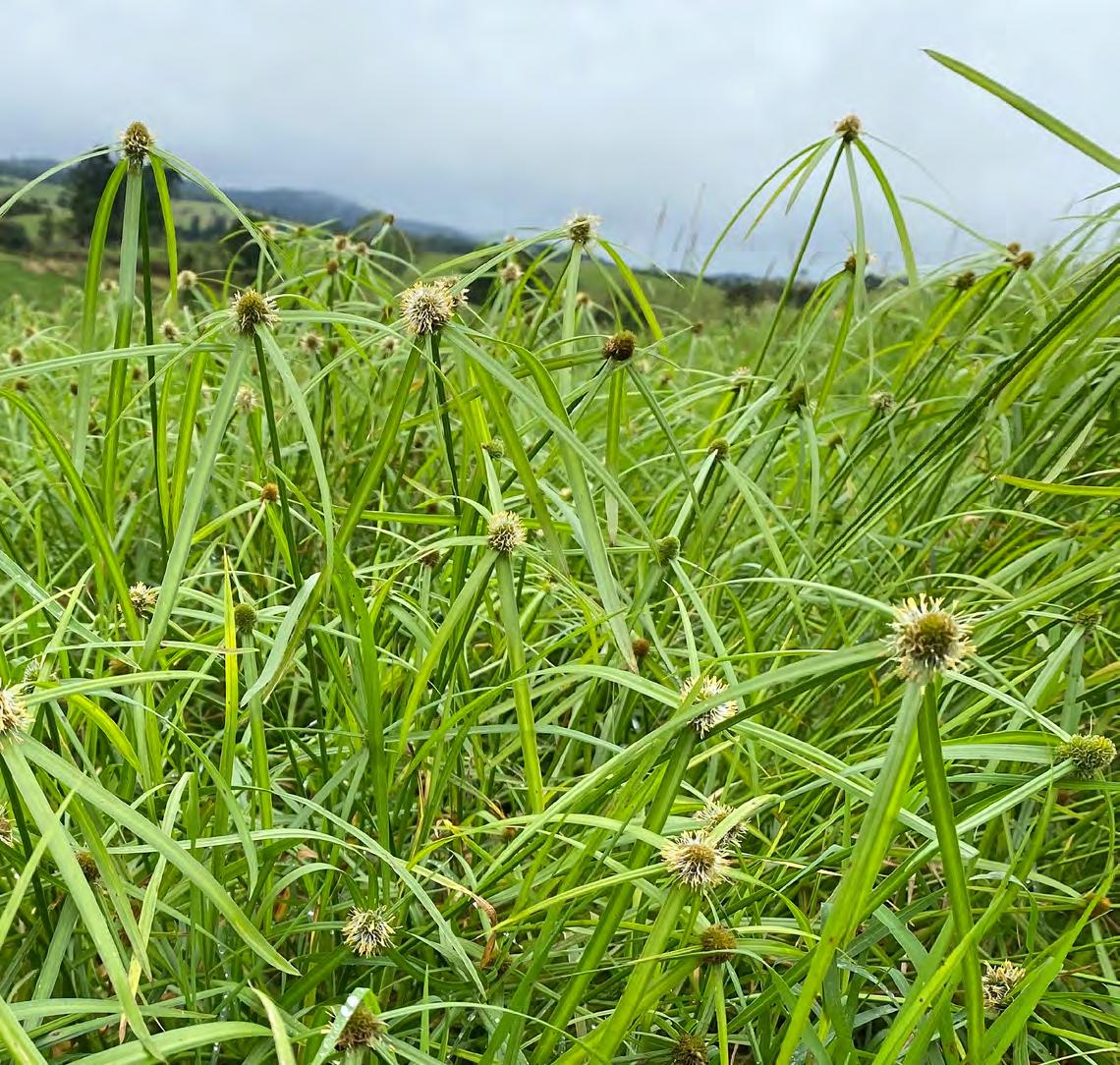
$100,000 plus. That’s how much Tony Rossi reckons his family’s enterprise has saved this year alone through precision composting. Over the past seven years, the Rossi family has almost halved synthetic nitrogen application rates on their sugarcane at Aloomba, south of Cairns, by using homemade compost to improve the organic carbon in the soil.
“The industry standard is 140 kilos of nitrogen per hectare and we’re under 80 now,” Tony said.
“When we first set up there wasn’t much in it but this year we’ve improved our soil health, it’s cost a bit more with the diesel increase but we’ve saved an extra hundred thousand dollars because fertiliser is so expensive.
“And we’ve maintained yield.”
Demonstrating that most growers can do the same is among the reasons Tony was named the recipient of the major prize at the Queensland Farmers Federation’s 2022 Reef Champion Awards, winning the Prince’s Trust Australia Environmental Leadership –Reef Sustainability Award.
The accolade recognised how he uses his skills as a chemist to improve on and pioneer farm practices, but also his willingness and passion to share what he’s learned with other growers.
A number crunch on the family’s composting initiative is showing it really paid off in 2022. Between $40,000 and $50,000 was spent making and

“It’s not a hippy thing, it’s a business decision based on an understanding of soil health.”
distributing the product, however with fertiliser prices soaring, it’s estimated the compost has saved up to $150,000 through reductions in synthetic nitrogen fertiliser.

“It’s not a hippy thing, it’s a business decision based on an understanding of soil health.”
While the compost itself does contain nitrogen and other trace elements, Tony is adamant it’s the organic carbon in the product that sets it apart.
“When you first open cane land up, whether it’s in the Amazon or the Burdekin, it’s about three to four per cent organic carbon,” he explained.

“Over time you strip the carbon and nearly all our cane land in the Queensland industry is 0.5 to 1.8 per cent organic carbon.
“The organic carbon result in a soil test tells you what nitrogen you can apply and if you reduce that nitrogen, you get less yield.
“But if you can increase the organic carbon and make your soil less like sand and more like potting mix, then the plant doesn’t need as much synthetic nitrogen.”
The compost is applied in the drills of the plant cane using a wagon hired from CANEGROWERS Cairns Region. That practice, along with using a mixed species fallow crop beforehand, means no fertiliser is needed at all on new plantings.
“We put 35 to 40 tonne to the hectare in the cane drills with the CANEGROWERS wagon, so we lay it into the drills and then we hill it over,” Tony said.
“We target the root zone so when we cut the cane it’s still there and the roots of the ratoons are growing in higher organic carbon and that’s how we’ve been able to get under 80 tonnes to the hectare of nitrogen application.”
The compost is made up of mulch the family buys from a local business, plus mill mud, cane bagasse, cane trash and council biosolids.
“The compost uses products that are problematic for the council like the biosolids and green waste that often end up in landfill,” Tony said.
“It gets dumped straight into a pit and we add all our cane bagasse and everything else.
“One bloke’s feeding the biosolids with the excavator and then the other bloke's putting the dry material into it, and it’s mixed in our feedlot mixer and run out into windrows.
“After a few days it all heats up with the composting process and really starts steaming when you turn it.”
“The farmer’s got to make it himself or it’s not viable.”Pictured below Tony Rossi was awarded Prince’s Trust Australia Environmental Leadership – Reef Sustainability Award at QFF Reef Champions Awards. Pictured right: The Cane Farmer Artist: Lynda Gregg
While the Rossi family aerate their compost with a turner purchased through a Reef Trust grant, Tony is trialling another method to prove all you need is a loader, backhoe or excavator and an acre of land for materials handling.
“The farmer’s got to make it himself or it’s not viable.”
“With the season starting in June/July, a farmer can get his allocation of mill mud, some mulch, access cane bagasse or anything else that’s lying around,” he said.
“Anything green has nitrogen in it and it really gets it cooking - and you can turn it over with a loader.
“A thermometer costs about 25 dollars to monitor the composting process. Initially, the temperature can be as high as 70 degrees Celsius and within a few weeks it will settle into the mid-50s. You can tell the process has finished when it drops down to ambient temperature.
“It can compost within about three months and then in November, you could start with a five-hectare plant cane block and set up your own experiment with reducing synthetic nitrogen rates.”
Tony, his four brothers - Chris, Mark, Peter and Stephen - and nephew Andrew are integral to the business.
Growing up alongside the Mulgrave River was the catalyst for their environmentally friendly practices.
Chris and Tony have been involved in Mulgrave Landcare for 25 years (Tony is Chairman) and have been systematically revegetating riparian areas with native
species, knocking out grassy weeds in the process.
Trees are propagated in an on-farm nursery which also supplies the Landcare organisation.
“Grasses don’t grow under shade so where the trees are mature, there are no weeds,” Tony said.
“It’s called the cathedral effect.
“You’ve got to work with the weeds initially because otherwise you get a heap of erosion, but after five or six years the tree’s roots are an interwoven web and the weeds will be shaded out and the tree roots will then keep the bank together.”
The tree planting has also helped keep waters of the creeks cooler, increasing the biodiversity of fish and reptiles and reducing the risk of mass fish kills caused by heat-induced low dissolved oxygen rates.
“There’s even a safety angle because you couldn’t drive a tractor in there anymore, the trees will stop you,” Tony said.
“You’re cutting the erosion, you’re making a biodiversity corridor, you’re cutting out rat harbourage by getting rid of grass seed, and you’re making a nice spot to enjoy with your family.”
Other water quality projects on the farm include sediment traps and revegetated boundary drains, while the family is now planning to build a new lagoon to be used as a combined retention basin and education centre.
Tony also recently received a Wet Tropics Management Authority Cassowary Award for being a community champion.
While he’s proud of the accolades, what’s most important to him is looking after the landscape he loves.
“This valley and the river is not abstract to me, it’s my home.”
“We are Smartcane BMP accredited but the real thing is being a proper steward,” he said.
It’s the right thing to do.”
Prince’s Trust Australia Environmental Leadership – Reef Sustainability Award
Tony Rossi, Aloomba, for using his scientific skills on the farm. Tony was always interested in soil health, soil testing, developing precision agricultural techniques and regional environmental issues, and is an advocate for demonstrating on-farm sustainable environmental practices to other farmers and industry.
Denis Pozzebon, Mt Kelly, for being a true champion and pioneer in precision nutrient management in the lower Burdekin. Denis was one of the first cane farmers who had his farm’s electromagnetic induction (EM) mapped into zones for nutritional programs.

Rebecca McHardie, Mossman, for being a respected extension agronomist in the Mossman cane growing region. She has been instrumental in designing and delivering grant programs to improve productivity and reef water quality outcomes.
“This valley and the river is not abstract to me, it’s my home.”








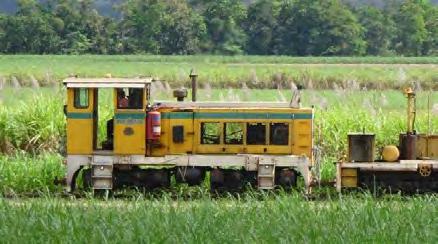
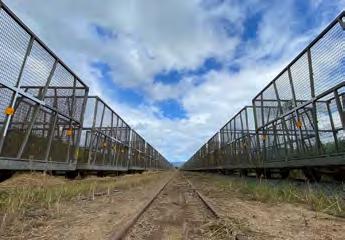




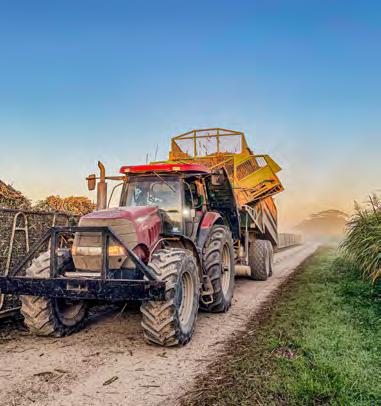
CANEGROWERS farewells two longstanding employees that have been fundamental stalwarts of growers in their respective districts.
With exemplary dedication and expertise throughout their lengthy employment with CANEGROWERS its time to wish them well on their retirement.
Michael (Mike) Porter – District ManagerMike married Ann, a Proserpine sugarcane farmer’s daughter and now has three adult children, and a growing number of grandchildren.
With a strong banking background he commenced with the CANEGROWERS Proserpine office in November 2008.
As the CANEGROWERS Proserpine District Manager he has continually worked closely with members, Wilmar and local authorities to maintain a healthy balance within the Proserpine sugar industry.

Mike has ensured a strong presence in the community every year supporting the Show Whitsunday by showcasing the local industry’s finest cane.
Mike's been integral in the industry providing support and knowledge, negotiating with Wilmar to create CANEGROWERS Proserpine CSAs and their ongoing reviews, and has supported members through farming grant application processes.
Over the years Mike has overseen Board Director elections and provided continual support to Directors.
He was instrumental in the formation of Sugar Services Proserpine Ltd (SSP) in 2013, after dissolution of Proserpine Cane Protection and Productivity Board and held the role of Secretary of SSP from its inception.
Mike saw the transition from Kelsey Creek Water Board and Six Mile Creek Water Board to KCWCL and SMCICL (Boards to Co-Operatives) and was Secretary for Kelsey Creek Water CoOperative Ltd and Six Mile Creek Irrigators Co-Operative Ltd.
Mike liaised with growers and the mill board during the sale of the Proserpine Co-Operative Milling Association to Sucragen, then saw the transition from Sucragen to Wilmar.
And when natural disasters have hit the area like Tropical Cyclone Debbie in 2017, growers knew they could depend on Mike in the aftermath, including placing a Natural Disaster Grant employee in the Proserpine office to assist members seek financial support to restore farming land.
With active and extensive advocacy Mike has been a representative on a number of local Boards and community focus groups including Whitsunday Community Bank, Proserpine Chamber of Commerce, Proserpine AP&I Association, Whitsunday Climate Change Advisory Panel.
“During his time he has witnessed major changes in our local industry, from the local mill sale to grower choice marketing,” Glenn said.
“He’s been a great bloke to work alongside and on behalf of the board and members, we’d like to wish him all the best in his retirement.”
While she arrived at CANEGROWERS Mackay in February 1994 as a temp, it’s now some 29 years later that Rita Scotton has decided it’s time to pull up stumps.


Executive Assistant Rita Scotton has been the heartbeat of CANEGROWERS Mackay for 29 years. There are not too many admin jobs that she hasn’t experienced, and she is the go-to knowledge bank for many staff members.
Rita has an encyclopedic knowledge of our organisation’s history and membership. She has been a diligent documenter of board meetings and has only missed one board meeting in 20 years.
After that initial temp placement, Rita’s talent for figures saw her employed full time as Payroll Officer. By 2003, she was appointed to the Executive Assistant role, working alongside two CEOs, Scott
Perkins and Kerry Latter, over almost 20 years in the role.
“It seemed like a never ending merry go round of meetings, workshops, discussion papers, enquiries, reform packages, reports, disaster relief packages, drought declarations and so on,” Rita said.
She said the Brisbane office had been a great support over the years, and, like district offices, these are hubs for a great deal of activity.
“There is often a lot of background work going on which members may not be aware of. During my tenure I have always had high levels of expertise to draw upon from the CANEGROWERS Brisbane office,” Rita said.
“The highlight of working in a place so long, I would have to say it was the connections that I personally made with our cane growing members,” Rita said.
“I consider myself to have been very fortunate to have worked with generations of growers.”
She said she had immensely enjoyed her time with CANEGROWERS, but now looked forward to time for travel, volunteer work, and family timeparticularly being a “hands-on Nanny” for her four precious grandkids.
“I am truly grateful to CANEGROWERS Mackay for giving me the opportunity to work for so long in such a great workplace. I have had the pleasure of working with many elected members and coworkers, past and present, sadly some who are no longer with us.
"I am blessed to have had them in my life, however the time is right for me to move on.”
Dedicated approaches to extension services have been honoured at the 2022 Reef Champion Awards dinner in Cairns with Rebecca McHardie from Mossman receiving the Reef Extension Officer Champion Award.
Rebecca, pictured taking soil samples on farm below, has worked in the industry for seven years and has been instrumental in supporting growers to improve productivity and reef water quality outcomes.

The Awards, run by Queensland Farmers’ Federation (QFF) with support from Prince’s Trust Australia, Australian and Queensland governments, recognise the outstanding achievements of individuals and organisations working to improve the quality of water entering the iconic Great Barrier Reef.
Mick Quirk, CANEGROWERS Senior Manager Environment and Sustainability, has worked with Rebecca in her role as a Smartcane BMP facilitator and as a valued productivity services professional. He said she is widely respected by the local growers for her expertise and positive approach.
“Rebecca works with Mossman Agricultural Services as an Extension Agronomist,” Mick said. “She has also designed and implemented grants programs and extension support to growers to improve both productivity and reef water quality.
“As a Smartcane BMP facilitator, Rebecca assisted 48 growers to benchmark their farm business in the program and supported 21 growers to accreditation – which accounts for almost 50% of the Mossman cane area.”
Smartcane BMP Manager Kate Gowdie said Rebecca was a valued member of the Smartcane BMP facilitator network for more than five years and has recently supported growers reaccreditation in the program.
“Rebecca's knowledge, experience and expertise in the agronomic, reef and regulatory space makes her a valuable asset to our team and of course, growers in the Mossman district.
“On behalf of the entire Smartcane BMP team, we would like to congratulate Rebecca on her much deserved award.”
Rebecca credits peer-to-peer learning as being as important for extension officers as it is for growers. She is part of the northern productivity services group, which regularly come together to share learnings and experiences.

Supplied
At Week 25, week ending 11 December Mossman Mill had crushed 709,563 tonnes of cane for a mill average of 12.18 CCS. Coastal growers supplied 461,236 tonnes of cane for a coastal average of 11.49 CCS and Tableland growers supplied 248,327 tonnes of cane for a Tableland average of 13.45 CCS. At this time there is about 50,000 tonnes of cane yet to be cut and supplied to Mossman Mill depending on weather and quality of the cane. Due to weather delays around this time, the finish date was moved beyond Christmas.
The extended crush has really affected the coastal cane quality and CCS. Cane was condemned due to deterioration from age, weather, rat, pig and cane grub damage. Weekly average CCS fell quickly in the final weeks of harvest and the late finish will impact the crop for 2023. It was a very stressful and frustrating crushing for all stakeholders.
The Mossman Bargaining Agents met with mill representatives on 5 December and talked about seasonal performances, factory performances and how the end of the crushing was to be handled. The Far Northern Milling (FNM) Board made the decision to pay growers down to 5.5 CCS regardless of purity.
Works are underway to repair the main alternator that creates electricity from steam generated by the mill boiler system. Damage to the alternator was sustained due to a lightning strike about a month back. Maintenance in the off-season will also include work on the milling train where Number 1 and Number 6 mills need major work. The main shredder turbine will also be reinstated prior to crush in 2023.
We congratulate Rebecca McHardie from Mossman Agricultural Services and winner of the Reef Extension Officer Champion Award for extension support to improve productivity and water quality.
A collaboration between Devils Thumb Distillery and FNM has culminated in Best Cane Spirit (sugarcane juice) at the inaugural 2022 Australian Rum Awards held in Brisbane this month. To see the full article visit https://bit.ly/3j7rXs4
On a lighter note, we wish all of our grower members a much brighter 2023 season and commend FNM Laboratory Analyst J Atkins for taking this beautiful photo whilst completing water sampling at Mossman Mill.

With the crushing season having finished for the region, growers are busy with those farm duties that require attention. Beans are going out and the demands on the CANEGROWERS Cairns Region direct drill bean planter are being experienced.
The AGM was recently held with CANEGROWERS Chair Owen Menkens attending as the guest speaker. Growers
enjoyed a social BBQ following the meeting where the Babinda Lions Club provided an excellent burger.
Congratulations to Tony Rossi on being awarded the Reef Sustainability Award as a part of his advocacy around on farm sustainable environmental practices. A proud moment for the Rossi Family.
Harvest week - 26
MSF’s South Johnstone mill finished crushing on 1 December with approximately 1.5m tonnes being crushed in just over 24 weeks. An additional 215,904 tonnes of cane were transferred to Mulgrave Mill for crushing. The average cane payment CCS for the mill area was 11.63 for the year. A total of 802.10 hours were lost due to wet weather and 244 hours lost due to manufacturing issues.
With a mechanical efficiency of 92.25% MSF Sugar management and staff are to be congratulated on outstanding factory performance, including transport and logistics, particularly as the growing and milling sector endured another season of labour shortages. The spirit of cooperation between mill staff and CANEGROWERS Innisfail has been highly valued and productive and we look forward to working together to strengthen the local industry this year. The efforts of local harvesting
CCS to date - 11.62
Tonnes to date - 1,575,518 (100.00%)
contractors are also acknowledged as they worked diligently to ensure mill throughput and the timely removal of the crop.
CANEGROWERS Innisfail held its annual, post-season grower meeting on the 12 December with approximately 50 growers and industry stakeholders attending. The evening was a great opportunity to catch up and hear the latest industry updates from Chair Joseph Marano and invited guests.

The Board and staff of CANEGROWERS Innisfail would like to thank our members for their continued support. We wish you and your families a safe and prosperous year.
Harvest week - 28
The Tully district has now completed over 97% of the 2022 crush and the crushing season is expected to be finished by Friday 16 December. The average CCS is 12.34 to date, with a current mill area yield of 98.5 tonnes/hectare.
The Tully Variety Management Group will hold its annual end of season meeting and BBQ this month, which is a great opportunity to recap the season and catch up prior
CCS to date - 12.33
Tonnes to date - 2,813,438 (97.02%)
to the new year. SRA held two more workshops this month focused on Strategies for Successful Soil Sampling. Planning is underway for Chemical Competency training to be held in January and CANEGROWERS Business Essentials in February.
Tully CANEGROWERS would like to wish everyone a safe and happy new year!
Harvest week - 26
The Herbert River district has crushed approximately 4.4 million tonnes up to the middle of Week 27 with CCS season to date at 11.71. The season end date remains at 7 January pending weather. It has a been a disappointing season in relation to the sugar content due to several factors including unseasonal weather.
CCS to date - 11.66
Herbert River Chairman Chris Bosworth and Manager Frank Scardamaglia attended the Great Barrier Reef Water Quality Synthesis workshop in Cairns, pictured below. We continue to be involved in these as we believe it is beneficial to understand what is being discussed and workshopped to provide the growers

Tonnes to date - 4,296,400 (88.59%)
and sugar industry perspective. The Major Grants Project run in the Herbert River district has been a success to date with approximately $1.1 million granted to growers in the district to purchase eligible equipment to assist them to uptake best practices.
We wish all members a prosperous 2023 season.
Harvest week - 26
By the time you read this, some of the growers in the Burdekin will be finished the 2022 season and in relax/ relief mode and some will be struggling into January 2023, trying to get the last of their cane off. At the time of writing, the Burdekin had delivered 7.5 million tonnes out of an 8.2 million tonne crop with a season to date CCS of 13.88. Rain has hampered harvest and growers were starting to get very tense about getting the remaining 9% in. There was a last-minute effort to transfer cane to Invicta mill which was planned to be kept open until 21 Dec. This was a late call elicited from Wilmar to process cane transfered from the other three mill areas.
Wilmar has been very keen to blame the late finish on La Nina and yes this little girl has been busy with the gift of rain for which there can be no denying. However, mill stoppages within Wilmar’s control have also been a contributing factor and if the factories had ran more reliably, we would have had an earlier and more respectable finish.
There is nothing to be proud about any sugar mill that has had up to six months of down time to do pre-season
CCS to date - 13.88
maintenance, a task of which they have been used to doing for over a hundred years, and then subsequently achieve a reliability rate in the 80% range for the season. Is this good enough? We don’t think so. Hard rock crushing plants in mines target 95% reliability, sugar ship loaders run at reliability rates in the high 90% range and cane farmers and harvesting contractors are all ready to go reliably on time and yet the growing sector remains hostage to substandard performance of a sugar mill. We had an interesting comment from a new member who has come into the sugarcane industry from the grains industry and they said despite what they do on the farm in terms of efficiency and growing the best crop they can, it can come undone if the miller hasn’t been investing capital into their factory to reliably process that crop.
Mill performance is a significant industry wide issue, and we need the millers to invest more capital into their factories to get them at a reliability rate of 90% or higher to give growers confidence that they will get their crop off. Good factory performance in the Burdekin across all sites would
Tonnes to date - 7,455,805 (91.48%)
negate the need to transfer cane and we simply don’t have that confidence in some of the Burdekin mills which is a shame, as confidence is a vital ingredient to keep you going forward. In terms of capex over the off season, there are projects in the mill that need to be completed in time for the 2023 season start. Given the late finish for the 2022 season, we have our doubts that not all of the mills will be ready for next season and we have asked Wilmar to commence contingency planning for cane transfer at the start of the season in case capex and maintenance is not completed in time. Growers cannot afford another late season finish and they cannot afford for Wilmar to not come to the party early with a back-up plan for cane transfer.
Cane fires are a rich part of the fabric of the Burdekin sugar industry, however fires followed by rain can result in financial losses by growers when they can’t get that burnt cane off. This is not that frequent but does happen and in 2022 we have had a higher number of instances where burnt cane in the paddock has been condemned where it is full of pink mould and it has started to shoot again.
Harvest week - 24
CANEGROWERS Proserpine and Sugar Services Proserpine conducted their Annual General Meetings on 29 November with around 40 members and invited guests in attendance. While the AGM focused on the 2021 crushing season, there was plenty of discussion regarding the 2022 harvest, particularly as crushing is not expected to be completed until the first week in January.
It’s been a long time since Proserpine has extended its crush past December and while La Nina has played its part, mill performance has been the primary cause for the delay.
A number of Wilmar senior executives attended the AGMs along with Proserpine Mill’s Operations and Cane Supply Managers.
In response to members concerns about the poor performance, Wilmar representatives acknowledged the growers’ efforts in producing the bigger crop but conceded their pre-season program was delayed by supply chain issues, and the loss of knowledge and expertise in key areas.
MACKAY
CCS to date - 14.00
Wilmar pledged to provide more bins next year, including 60 new 10-tonne bins in addition to 30-40 damaged bins which would be repaired ahead of the next crush.
The loco fleet would also be improved from ‘in-house’ resources, however this will be a 3 to 4 year program.
Wilmar stated they have already instigated changes at Proserpine Mill – and commitments were given that the mill’s capital and maintenance investment would be maintained.
Given the longer-than-normal crush, Wilmar has agreed to meet with CANEGROWERS representatives early next year to consider an earlier start of the 2023 harvest.
At the conclusion of the Annual General Meetings, Productivity Awards were presented to the following growers:
• Zone A: Cantamessa Farming5.80 TSH
• Zone B: GJC & RS McDowall4.90 TSH
Harvest week - 26
With the extended 2022 crush that has dogged growers almost behind us, it’s time to move forward optimistically into 2023.
Following a successful outcome in negotiation with Mackay Sugar on 8 December, that has secured a payment schedule for 6 to 7 CCS cane sent to mill in the remainder of the current season, Mackay Area Committee will continue to work on securing a better deal for Mackay district growers with their cane supply agreement.
Labour supply is another issue that never quite goes away, so we will continue to work on the attraction of travelling workers to our outstanding region, which is increasingly a destination of interest.
PLANE CREEK
Tonnes to date - 1,576,866 (86.17%)
• Zone C: RA & C Wilson - 13.70 TSH
• Zone D: DJ Lee - 15.20 TSH
• Zone E: Ted Jeppesen Family Trust - 16.40 TSH
• The overall Producer of the Year: Ted Jeppesen Family Trust
CCS to date - 13.02
If anyone has feedback on successes or challenges experienced with labour in 2022, please email Kirilikirili_lamb@canegrowers.com.au.
Following the success of running two Haulout Operator courses, in collaboration with QAWN in 2022, CANEGROWERS Mackay has applied to DESBT’s Skilling Queenslanders for Work program to fund for two courses in 2023. We are awaiting funding announcements for that program.
We will also continue working towards the realisation of biofutures opportunities for the region’s sugar industry and ensuring that growers reap financial benefits from any value add to their cane.
We encourage members who have not previously taken part in Business
Harvest week - 26
CCS to date - 13.03
CANEGROWERS
Proserpine has recently reviewed the Collective’s interim payment CCS which currently sits at 13.80. The year-to-date average CCS, at the end of Week 23 was 14.12, however, given the prospect of another 3-4 weeks of harvesting, and the forecast of more rain, it was considered prudent to reduce the payment CCS to 13.60.
To lessen the impact on growers, the reduction has been timed to coincide with the marketer’s next Advance Rate increase scheduled for midDecember.
Tonnes to date - 4,703,106 (82.95%)
Essentials to enrol in the one-day face-to-face offering planned for Mackay on 28 February and Plane Creek on 1 March.
Responding to member feedback, succession planning is now included, as are some online components to take a slower dive into the course material, which also covers budgeting, planning, risk management and pricing. The series of workshops are run by CANEGROWERS highly experienced farm economists, sugar marketing and risk specialists, and solicitors. Find the links in your emailed CEO Updates.
Any growers requiring assistance with any issues are encouraged to call 4944 2600.
Tonnes to date - 1,324,606 (88.31%)




Harvest week - 26
CCS to date - 13.05
ISIS Tonnes to date - 715,825 (85.22%)
At lot has been happening across the Isis District, we’ve experienced more wet weather, hosted our AGM, had a meeting with STL and been in constant communication with Isis Mill monitoring the crushing progress. By the time this update is published it will be 2023 and all going well the crushing will be in its final weeks. It was good to see growers roll up to our AGM last month. We heard from both Glenn Stockton the CEO of Sunwater who gave us an update on Paradise Dam and Peter Hawe from Isis Mill who gave a crushing update. We were also joined by Chris Robertson and Nicole Scanlan from the Commonwealth Bank and QSL Relationship Officers Anna Lloyd-Jones and Michelle La Rosa-Aili
At our final board meeting for 2022 we heard from STL, CEO David Quinn . David updated us on the progress of the new sugar handling agreement, asset investments across all ports, and the diversification and unique opportunities available at each site. He also explained the process around the outage of the Bundaberg ship loader to take place in early 2023 and the modification to the ship loader chute.
Harvest week - 26
Bundaberg Sugar Mills processed 25,776.77 tonnes for the week ending 4 December. This brings the season to date to 944,275.80 tonnes and the average CCS for Bundaberg Sugar Mill for Week 25 was 12.07.
The season CCS average for Bundaberg Sugar Mill is at 13.39 CCS and the highest individual CCS for the week was 16.00 units for Q252 First Ratoon.
Base CCS was dropped to 13.00 in Week 26 as crushing recommenced following rainfall at the end of Week 25. Arrangements for the end of crushing were shared with growers at a meeting on 14 December.
At our recent board meeting Directors received an update from David Quinn, STL CEO, on the progress of development at the Bundaberg Sugar Terminal facility
Harvest week - 26
At the time of writing we may still be harvesting cane and hopefully we have been able to get a lot more of the crop in. Weather has been a significant influence and the planting period for soybeans is fast approaching for a number of varieties. Check with Tony at MCPS for any guidance you might need.
CCS to date - 13.34
Tonnes to date - 984,169 (91.95%)
including upgrading of the ship loader to include three different chutes to accommodate exports other than sugar as well as progress of the new sugar handling agreement.
Planning for the 2023 Season is underway and growers will be kept informed via email, newsletter and meetings where required.
If you are not on our email list please contact the office on 4151 2555 or email bdb_office@bdbcanegrowers.com.au

CCS to date - 13.07
Tonnes to date - 496,749 (77.02%)
Hope you all enjoyed your Christmas and the new year ahead is again a good growing year.
Harvest week - 7
At the time of writing, 12 December, the Rocky Point Mill has completed just seven weeks of crushing. The mill has crushed a total of 97,794 tonnes of cane at a season average CCS of 13.77.
The mill has averaged around 15,000 tonnes per week since they began crushing on 29 October, varying from 7,000 tonnes to 21,000 tonnes.
Our estimate is currently 372,495 tonnes, and we are unlikely to get even half the crop off this season, as a direct result of our miller not being ready to crush in July as contracted.
CCS to date - 13.86
Tonnes to date - 97,795 (26.87%)
This has left growers frustrated, financially strapped, and wondering when the Rocky Point Mill will show some goodwill by taking some responsibility for the situation and assisting to mitigate grower losses. The closure of the mill between Christmas and New Year has growers baffled.
We are still hoping to crush well into January, however, the CCS has started to drop, and the weather forecast has us worried.
A
strong
Membership is built around a strong value proposition that offers growers exceptional products, services, benefits and advocacy that you can’t get anywhere else.
2023 is shaping up to be another big year for the industry and January is a good time to reflect on the benefits that CANEGROWERS offers including:
• Crop insurance
• Management and negotiation of the cane supply agreement
• Advice from Chris Cooper on legal matters
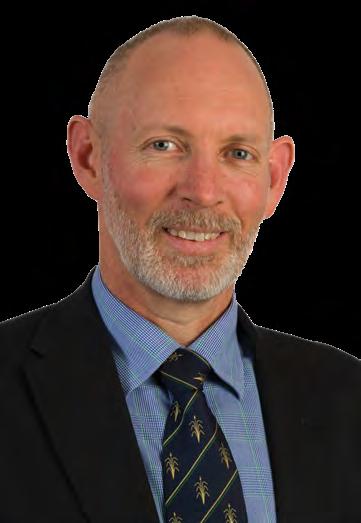
• Access to government and Ministers on important issues such as reef and trade
• Insight and information via member meetings and the monthly magazine.
Information and exclusive benefits for CANEGROWERS members
There is also a wealth of information on the CANEGROWERS website about our advocacy, products and services exclusive to members. These include:
CANEGROWERS Marketing Information Service - offers education and information to members. It is an independent service with Weekly Notes on market movements, a monthly video update and downloadable resources.
Cost of Production Tool - an easy-to-use spreadsheet to help growers calculate their own cost of production to assist with marketing and forward pricing decisions.
CANEGROWERS Business Essentials - a suite of professional development opportunities for growers providing tools to deliver greater profitability and therefore business resilience.
Workplace Health and Safety Guide for sugarcane farms - a tailor-made guide to the safe management of sugarcane growing processes and provides guidance for growers, their families, staff and visitors to be safe.
Transport / road access guides for farm equipment - a range of resources for members needing to move farm vehicles and equipment on public roads. A handy checklist and decision-making tool along with district guides of critical and major roads is available to all members.
Farm Supplies - BOC supplies CANEGROWERS members with industrial gases, welding equipment and safety products.
Health insurance - CANEGROWERS has partnered with Queensland Country Health Fund to offer a Corporate Health Plan offering coverage for health care anywhere in Australia with a choice of provider and a range of convenient ways to claim.
MEMBERSHIP ENGAGEMENT & INNOVATION MATT
I often hear from growers who are frustrated when things they don’t control are threatening their businesses. Understandably, the reactions are often emotionally driven, and growers look for someone to blame and/or fix the issue.
Currently the long season length in some mill areas, the increase in input prices, and shortage of drivers are big issues. Growers can feel powerless. And to a large extent you are, if you concentrate on the things you cannot control. However, whether you can control the risks directly or not, it is good practice to understand your business risks and plan accordingly.
In a purely business sense, you own the value of the net assets of the business, i.e. the business is just money. You can sell the farm and start another business or do something else with the assets. Nobody is stopping you. In this sense, you are master of your own destiny. But decision-making is clearly more complicated than this, with the farm often being the essence of a grower’s identity within the family and the community. Every business needs to identify and understand the risks, assess how they will affect the business and decide on how to address these risks to ensure the business survives and thrives. I think all growers do this in some shape or form.
However, I believe many growers would benefit by following a good process and a having a good budget setup with the ability to do some “what ifs”. For example, at a recent CANEGROWERS Business Essentials workshop, a grower said there was nothing he could do about a cyclone. While it is true you can do little to stop the damage, there is something you can do. Firstly, assess the impact and likelihood. This may be a 30% loss of income every 10 years and some additional costs (weed control) not covered by insurance offset by an expected grant. This information can then be entered into the budget as a “what if” and the extent of the loss determined. This allows you to assess if you have the reserves or borrowing capacity to survive and recover.
CANEGROWERS, with funding from the Future Drought Fund and Queensland Drought and Climate Adaption Program, is offering a great opportunity to address just this through the Business Essentials – professional development for growers (see advert on page 11).
Business Essentials provides some online modules to cover the basic requirements to be able to use the tools developed for budgeting and assessing risk. This is followed by face-toface workshops which will allow for discussion and greater understanding of the tools.
Armed with these tools there are two separate workshops focusing on the risks and options to mitigate them for sugar pricing and business succession.
I believe all cane growing businesses will benefit regardless of farm size or age of grower. Ideally, all family members who are involved in the business should attend. I strongly recommend you get involved in Business Essentials and engage with the skilled presenters. All the best for 2023.

► Growers can feel frustrated and powerless when things they don't control threaten their business.
► Every grower needs to identify and understand risks, assess how they will affect the business and decide on how to address these risks.
► Business Essentials is offering some online modules to cover the basic requirements to be able to use the tools developed for budgeting and assessing risk.
► I believe all cane growing businesses will benefit regardless of farm size or age of grower.
Biosecurity is always an issue, but often it is not front of mind. Of course, the last few years have been a strong reminder of its importance, and what happens when new diseases or pests arrive and spread.
COVID is the obvious example, but we’ve also seen the foot-and-mouth outbreak in Indonesia (Bali travellers “ditch the thongs”), the spread of African Swine Fever through south-east Asia and into PNG, incursions by fall armyworm and Varroa mite, and ongoing challenges from the spread of fire ants and electric ants.
Now, my parents frequently told me that cleanliness begins at home, not that you would know this from my workspace. But where does biosecurity begin?
It is a truism that biosecurity is everyone’s responsibility –individuals, small businesses, tourists, importers, airports and ports, corporations, governments. But if everyone is responsible, who is making sure the whole effort is efficient and effective?
Let’s start with a farm. How do we know if a sugarcane farm is biosecure? To be biosecure, a farm has measures in place that (1) protect against entry of a new disease or pest and, should a new disease or pest get on to the farm, (2) prevent its spread within the farm and to other farms.

► Biosecurity is everyone’s responsibility –individuals, small businesses, tourists, importers, corporations, governments.
► To be biosecure, a farm has measures in place that protect against entry of a new disease or pest and, should a new disease or pest get on to the farm, prevent its spread.
The same criteria for being ‘biosecure’ applies to each larger organisational area that the farm is part of: the district, the region, the state, and the country.
A biosecure Australia needs measures in place that (1) protect against the entry of diseases and pests that can affect humans, plants or animals and (2) eradicates it, or at least contains its spread, should an outbreak occur.
Many of these measures are clear at the regional and state level. At the regional level, industry-funded and state-funded services provide clean seed, new varieties, and protocols for cleaning machinery.
SRA and district productivity services organisations play a major on-theground role in assisting growers.
At the state level, regulations control the movement of sugarcane and sugarcane machinery between the sugarcane biosecurity zones. Quarantine between districts has greatly helped reduce the impacts of Fiji leaf gall, leaf scald and mosaic disease.
The national level is the tough one. While Australia has the advantage of relative isolation from the rest of the world, this is no longer a barrier with so much international trade and travel.
Also, we are not really that far from Indonesia and PNG, and insects like fall armyworm readily travel such distances.
We have a huge coastline and very busy entry points for freight and people. Not every person, bag or item of freight can undergo a full inspection.
► The national level is the tough one. While Australia has the advantage of relative isolation from the rest of the world, this is no longer a barrier with so much international trade and travel.
►Also, we are not really that far from Indonesia and PNG, and insects like fall armyworm readily travel such distances.
A targeted sampling approach is the only option. But how to resource this approach to maximise its effectiveness?
The Australian Government has regular reviews of the national biosecurity system and, unsurprisingly, its resourcing always come up.
Through the NFF, we continue to lobby government for a funding model that includes contributions from all industries and activities that influence the biosecurity risk. ►
One of the pioneers of Australia’s modern sugarcane industry has been laid to rest.

Viviano (Ricky) Rossi has passed away peacefully, surrounded by his family, aged 95. He was farewelled by hundreds of mourners at a funeral in Gordonvale, south of Cairns, in December.
Ricky and his brothers Robert and John trialled the first prototype of the Massey Ferguson 515 chopper harvester. It was the first mechanised harvester to cut commercially in the world.
Tony Rossi said his father was still driving tractors into late 80s.
“He was known as a very productive, strong, hard-working man and that’s why he lived to 95,” he said.
“He was such a gentle father and really taught us so much about the land.
“He had such a strong heart and he was a real inspiration to all of us.”
Ricky Rossi was a dearly loved husband, father and father-in-law, grandfather, great grandfather, brother and friend to many.
If you have news to share with the CANEGROWERS community, send us an email editor@canegrowers.com.au
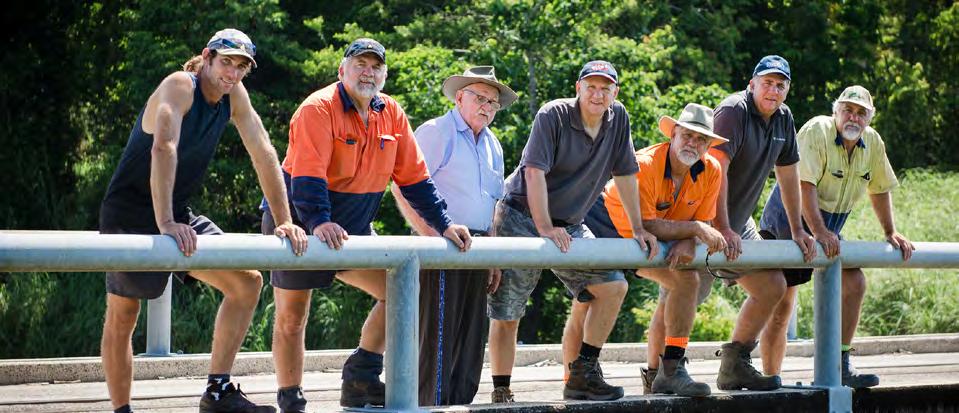
We strongly support a charge on inbound shipping containers. Three million containers are imported into Australia each year - along with these imports comes the risk of serious pests hitchhiking in, and on, the containers.
But this activity does not contribute to managing the risk. The previous government rejected this funding mechanism and we hope the new government will support it.
Your industry organisations also have important national roles. SRA and Plant Health Australia developed a Biosecurity Plan for the industry – this identifies the highest risk pests and diseases, and provides the control options for each.
SRA also has response plans for each of the highest risk pests and diseases.
And their researchers have first-hand knowledge of the major pest and disease threats by working closely with scientists in the countries where the disease or pest currently occurs.
CANEGROWERS is the industry signatory to the Deed that formalises how any pest or disease incursion will be managed and resourced by the affected jurisdictions and industries.
While industry is doing what it can to prepare against incursions and keep biosecurity front of mind, the national quarantine and biosecurity services need adequate funding if they are to minimise the risk of further pest incursions. ■
A recent series of Western Australia Supreme Court cases were finally resolved in the High Court in December 2022. These cases highlighted the risk that property owners face if privately owned power poles are not properly maintained.
The cases arose out of a bush fire in 2014. The fire started when a privately owned power pole fell to the ground and the electrical cables fell, caused arcing, which resulted in a fire starting at the base of the pole which spread.
The fire damaged 392 hectares of land and destroyed 57 houses.
Claims on behalf of many of those who suffered losses were made in the Supreme Court.
The defendants to the claims included the power company that owned the cable wire, the power company’s sub-contractor that had carried out certain works around the pole, and Mrs Campbell, the owner of the land and the owner of the pole that was located on her land.
The initial claims were filed in the Supreme Court and various appeals were instituted with eventually the High Court making final decisions. The outcome of the main case was that each of the defendants were found liable for negligence.
By Chris Cooper, CANEGROWERS Legal Advisor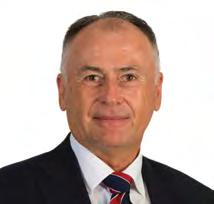
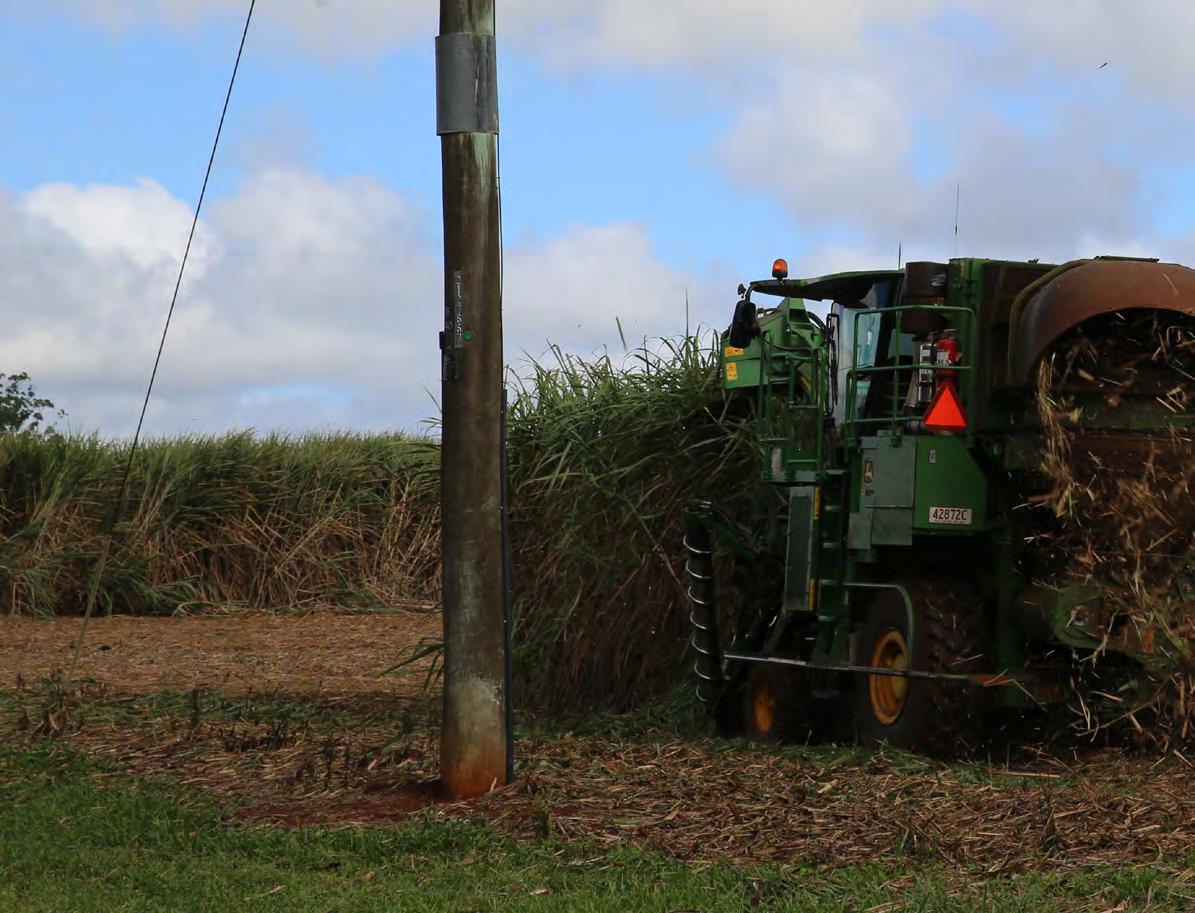
The property owner, Ms Campbell, was found to be negligent on the basis that the pole was not properly maintained.
The losses were ordered to be apportioned between the defendants in the following way:
• Power company 50%
• Sub-contractor 35%
• Mrs Campbell 15%
The property owner, Ms Campbell, was found to be negligent on the basis that the pole was not properly maintained.
The Court found that Mrs Campbell owed a duty to take reasonable care to inspect and maintain her pole in a safe and serviceable condition.
The Court found Mrs Campbell breached that duty as she took no steps to inspect the pole herself or arrange inspection by a suitably experienced person.
A proper inspection would have disclosed the pole was defective below the ground in that it had fungal decay and damage by termites.
Although the Court ordered Mrs Campbell responsible for 15% of the losses, with more than 50 houses damaged the losses were substantial. Hopefully Mrs Campbell had insurance cover.
Ergon Energy provides useful information to private pole owners about their responsibilities.
Ergon’s position is that if you own a property pole then keeping it safe is your responsibility.
These cases are useful reminders that:
• privately owned power poles need regular inspection and necessary maintenance.
• owners of private power poles may face liability claims if the poles fail.
• always ensure proper liability insurance cover is held
(This article contains general advice only. The particular facts and circumstances of each case always need to be taken into account).
Any CANEGROWERS member wishing to discuss any aspect of legal matters should contact their local CANEGROWERS district office or call me on Free Call 1800 177 159, for free initial legal advice.

Deeral tractors for sale Ford 9700 $11,800, JD 3140 $11,000, M F $6,000, FIAT 411R High Clearance$4,800 International 866 $9,000 and Ford 5000 $7,000. Ph: 0412968434.
Billet Planter Harvester - Austoft 7000 optimised for billet planting $50,000+GST. Ph: 0439852185 or 0448918422.

Ford 5000 MF 178 with loader 411 Fiat High Clearance. Best Offer. Ph: 0473332751.
2x Ian Ritchie 6t side tippers. VGC. Ph: 0740562063.
Massey Ferguson 8110 4-wheel drive with cab, 135hp, only 2,636 hours in good condition. $55,000 incl. GST. Ph: 0438606578.
6t side tipper Ian Ritchie, Excellent condition $15,000 + GST. Ph: 0478719294.
Celli Tiger spike hoe, 2.5m wide with hydraulic crumble roller and oil cooler. VGC. Mackay. Ph: 0438606578.
Don Mizzi 741 model on Fiat 750 special turbo plus MF102 half-tracks to suit. Mackay. Ph: 0438606578.
6t side tipper on Leyland tandem. GC. Mackay. Ph: 0438606578.Massey Ferguson 8110 4-wheel drive with cab, 135hp, only 2,636 hours in good condition. $55,000 incl. GST. Ph: 0438606578.
12t self-propelled 6x6 elev infielder. VGC. Mackay. Ph: 0438606578.
Plant cane cultivator 2x1.6m row w/ 3 weeder rakes and tines $2,200 incl. GST; Land plane w/ 4m. hyd. tilt blade $4,400 incl. GST; 2x1.6m.row cultivator w/ 10x 30ml. tines $2,200 incl. GST. Ph: 0408761463.
2019 John Deere 6175R,175 hp, 4WD, IVT Transmission, Starfire 6000 JD GPS, Front/ Cab suspension, Premium lights, 4 electric remotes, Front weights. 3600 hrs. UHF. Immac condition. Ph: 0419641518.
120” Howard HR Rotary Hoe, Teflon lined with crumpler roller. No oil leaks. Good working condition. Replacement blades required. $9,500 (inc GST) Ph: 0419641518.
100” Howard S-series Rotary Hoe, good working condition. $6,500 (inc GST) Ph: 0419641518.
JD 2010 3520 harvester 7700hrs GC $175, 000 + GST. Ph: 0418881343.
900 Litre Croplands Spray tank 3PL with boom. Hydraulic needs some TLC. $3,500 (inc GST) Ph: 0419641518.
Case 8810, 2018 model cut 4 seasons, low hour low tonnage machine, owner driver. Ph: 0427271278.
2 row Bonnel fertiliser box with ground drive, 1¼ inch tynes$1,100 Ph: 0413584728.

HBM billet planter set up for dual row or single. $10,000. Twin 2.5 tonne billet planter tipper bin, carries 5 tonne $5,000. All + GST. Ph: 0413584728.
Rail Infrastructure Maintenance Supervisor –Mossman Full Time position which has been advertised on Seek. Please send application including a covering letter via Seek or to HR@fnmilling.com.au For more information please contact Andrew Fischer on 0407 585 575
Full time field worker position available. Knowledge in the use and maintenance of billet planter and spray equipment preferred. Ute and three bedroom house with large shed/garage supplied. Email resume to briebrieestate@conxx.com
Cane farm for sale, 124.95ha, 2 x large sheds, machinery & house, Silkwood area. Ph: 0467333989
Cane Farm Cooks Lane Victoria Plantation. 69.75 ha. 61.38 ha under cane. High producing area. 1km from Victoria Mill. Road frontage. Ph: 0427912277.
70ha Cane Farm with 61.5 ha under cane. Located 8 km from town centre and 1 km from Victoria Mill. Property is flood free with town water supply running along property front. Paddocks have all been lasered and are well maintained and up to date with new varieties. Ph: 0427912277.

Cane farm to lease Munburra, Sunnyside or Oakenden areas. Have own equipment. Ph: 0408011983.
840 meters opposite Moore Park Beach. Coastal Cane Farm 93 Acres and 146 megalitres of ground water. Large storage Shed. 1 x Diesel Irrigation pump for the underground irrigation. There are 2 fenced off areas, currently used for horses and cattle. No house on this property. Comes with crop. Ph Larry: 0418496864. Pleystowe cane farm. On 2 Lots. Approx 190 acres all up. Teemburra water, 2 pumps & licences, plus 32,000 gallons an hour underground bore. Machinery/irrigation shed. 2x 4" soft hose irrigators, farm lasered, underground main throughout. 2 sidings adjoin farms. Access to farm from Pleystowe School Rd & Formosa's Rd. Does not include 2021 crop. Selling due to health reasons. Ph: 0408733793.
Want to buy farm in Victoria Plains, Eton, Pleystowe area. Ph 049 00 29 387
Wanting to buy/lease cane farm in the Septimus area. Ph: 0417607722. Wanting to buy/lease cane farm. Close to Racecourse mill, Tekowai, Alexandra areas. Ph: 0438545251.
Want to buy farm in the Mackay or Proserpine area. Must have two good condition houses and irrigation. Ph Paul: 0447545550.
WTB: Grazing & Irrigation Property. Grazing to run 300-500 head. 100 - 200acres irrigation. Located Sarina-Proserpine Regions. Ph James: 0429621145. Wanting to lease - cane farm in the Walkerston/Eton/Pleystowe areas and surrounds. Ph: 0421520331.
Young grower wanting to expand. Looking for farms to lease. Mulgrave Area. Ph: 0431036229.
Location
Recorded rainfall (mm) Average rainfall (mm)
Month prior (Nov 2022) Month to date (1 Dec-18 Dec) Year to date Jan–Dec
Whyanbeel Valley (Mossman) 358.6 100.4 3042.8 2944.1
Mareeba Airport 31.6 92.4 885.2 834.8 Cairns Aero 37.8 104 1742.4 2006.9
Mt Sophia 66 87 3520 3401.9
Babinda Post Office 0 0 3611.1 4265.8
Innisfail 68.4 87.2 3117.6 3547.3
Tully Sugar Mill 50.1 121.9 3353.8 4069.4
Cardwell Marine Pde 90 141.2 1665.4 2117.8
Lucinda Township 137.6 161 2024.4 2126.8
Ingham Composite 150.6 181.8 1897.8 2119.7
Abergowrie Alert 22 60 406 1371.9
Townsville Aero 293.2 43.2 1377 1134.4
Ayr DPI Research Stn 31.6 63.8 930.4 935.8
Proserpine Airport 67.6 86.6 1244.2 1436.4
Mirani Mary Street 102.8 98.4 1001.3 1464.8
Mackay MO 59.6 53.4 1057.2 1578.4
Plane Creek Sugar Mill 122.7 49.6 1134.5 1739.6
Bundaberg Aero 36.2 47.6 1062.2 1005.2
Childers South 53.6 78 1200.4 896.9
Maryborough 69.8 158.8 1240.6 1145.9
Tewantin RSL Park 39 88 2367.2 1596.2
Eumundi - Crescent Rd 0 0 2297.8 1676.9
Nambour DPI - Hillside 63.8 88.4 2697.8 1645.8
Logan City Water Treatment Plant 66.2 49.4 1497.6 1119.3
Murwillumbah Bray Park 18.1 33.6 1771.8 1607.6
Ballina Airport 27.2 101.4 2631 1787
New Italy (Woodburn) 16.6 90 2378.8 1350.3



